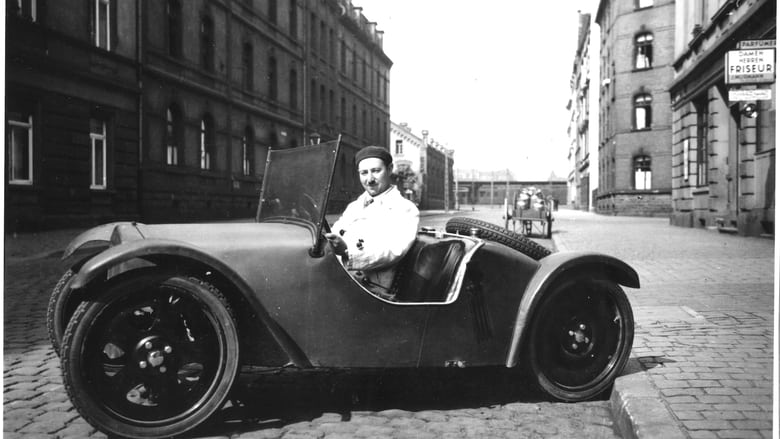

Ganz: How I Lost My Beetle
Genres
Overview
Josef Ganz, editor of trade journal Motor-Kritik, amazed Germany by appearing in a revolutionary tiny car in 1932. It was his dream: a people's car anyone can afford. The idea made its way to new Reichskanzler Adolf Hitler. But in Hitler's dream there was no place for Jewish inventor Ganz. This is the story of the man whose designs led to the invention of the Volkswagen Beetle, and who ultimately lost everything. In the film, Ganz's relatives and admirers bring his lost heritage back to life.
Details
Budget
$0
Revenue
$0
Runtime
55 min
Release Date
2019-05-02
Status
Released
Original Language
English
Vote Count
3
Vote Average
6.7
Joachim Król
Josef Ganz (voice)
7.0
John Lilly and the Earth Coincidence Control Office
John C. Lilly is the inventor of the isolation tank, as well as pioneer of studies in dolphin intelligence and support of psychedelics as a positive means for expanding consciousness. The storytelling will be supported by interviews with Lilly’s contemporaries and colleagues, as well as extensive archival records.
2025-01-31 | en
6.9
Triumph of the Will
A showcase of German chancellor and Nazi Party leader Adolf Hitler at the 1934 Nuremberg Rally.
1935-03-28 | de
10.0
The Tea Coffee Experiment
A group of friends come up with the brilliant idea of testing the non-existent drink known as "Tea Coffee".
2017-12-27 | it
7.5
The Gutenberg Enigma
A portrait of the inventor of the letterpress, who was a key figure in the history of mankind, but also an enthusiastic inventor, a daring businessman, a tenacious troublemaker: the life of Johannes Gutenberg (circa 1400-68).
2017-09-25 | fr
5.7
Who was Hitler
Hitler's biography told like never before. Besides brief historical localizations by a narrator, only contemporaries and Hitler himself speak: no interviews, no reenactment, no illustrative graphics and no technical gadgets. The testimonies from diaries, letters, speeches and autobiographies are assembled with new, often unpublished archive material. Hitler's life and work are thus reflected in a unique way in interaction with the image of the society in the years 1889 to 1945.
2017-11-16 | de
5.5
An Article of Hope
An inspiring documentary film that details the life mission of Col. Ilan Ramon, the first and only Astronaut from Israel, who blasted off on the Shuttle Columbia. He carries with him a cherished artifact, a miniature Torah scroll, that had survived the Holocaust. From the "Depths of hell to the heights of space," his simple gesture would serve to honor the hope of a nation and to fulfill a promise made to generations past and future.
2011-05-01 | en
7.5
Fascism in Colour
After the World War I, Mussolini's perspective on life is severely altered; once a willful socialist reformer, now obsessed with the idea of power, he founds the National Fascist Party in 1921 and assumes political power in 1922, becoming the Duce, dictator of Italy. His success encourages Hitler to take power in Germany in 1933, opening the dark road to World War II. (Originally released as a two-part miniseries. Includes colorized archival footage.)
2006-01-01 | en
0.0
The Final Days of Adolf Hitler
2024-06-20 | fr
7.0
Bombshell: The Hedy Lamarr Story
The life and career of the hailed Hollywood movie star and underappreciated genius inventor, Hedy Lamarr.
2018-06-06 | en
8.0
June 1940, the Great Chaos
From May 10, 1940, France is living one of the worst tragedies of it history. In a few weeks, the country folds, and then collapsed in facing the attack of the Nazi Germany. On June 1940, each day is a tragedy. For the first time, thanks to historic revelations, and to numerous never seen before images and documents and reenacted situations of the time, this film recounts the incredible stories of those men and women trapped in the torment of this great chaos.
2010-06-14 | fr
7.0
Religulous
Commentator-comic Bill Maher plays devil's advocate with religion as he talks to believers about their faith. Traveling around the world, Maher examines the tenets of Christianity, Judaism and Islam and raises questions about homosexuality, proof of Christ's existence, Jewish Sabbath laws, violent Muslim extremists.
2008-10-01 | en
0.0
The Auschwitz Trial
The biggest trial of Nazi war crimes ever: 360 witnesses in 183 days of trial - a stunning and gripping portrayal of the most terrible massacre in history.
2013-01-02 | de
0.0
After Mein Kampf?
By combining actual footage with reenactments, this film offers both a documentary and fictional account of the life of Adolf Hitler, from his childhood in Vienna, through the rise of the Third Reich, to his final act of suicide in the waning days of WWII. The film also provides considerable, and often shocking, detail of the atrocities enacted by the Nazi regime under Hitler's command.
1961-08-01 | en
7.4
Nikola Tesla: The Genius Who Lit the World
Nikola Tesla is considered the father of our modern technological age and one of the most mysterious and controversial scientists in history.
1994-01-01 | en
6.0
George Washington Carver at Tuskegee Institute
Color footage of inventor George Washington Carver at Tuskegee University in Alabama. Dr. Carver is filmed at his apartment, office, laboratory, and garden.
1937-12-31 | en
7.3
Die guten Feinde
An intimate quest by a son to understand the identity of his father; a look back at the Berlin of the 30s and a special group of friends who loved life and, in the darkest hours of German history, ultimately chose good over evil.
2017-05-11 | de
5.0
Hitler: The Comedy Years
A documentary about the portrayal of Adolf Hitler in popular culture.
2007-05-10 | en
10.0
Besa: The Promise
A documentary exploring how Albanians, including many Muslims, helped and sheltered Jewish refugees during WWII at their own risk, and trying to help the son of an Albanian baker that housed a Jewish family for a year return some Hebrew books that the family had to leave behind.
2012-07-19 | en
0.0
Operation Foxley: The Assassination of Hitler
Throughout his time as head of the Nazi party, Adolph Hitler evaded numerous attempts to assassinate him. However the secret Operation Foxely came the closest to succeeding. Based on declassified World War II documents from the British secret service, this award-winning film reconstructs the detailed plan that nearly resulted in the murder of the notorious German Fuhrer, and why it failed.
2017-06-16 | fr
7.1
42 Ways to Kill Hitler
National Geographic looks in some detail at 6 of the many close brushes with death Adolph Hitler had at the hands of assassins. The potential for the plots to succeed are examined as is the unpleasant fate of the would be assassins.
2008-11-16 | en